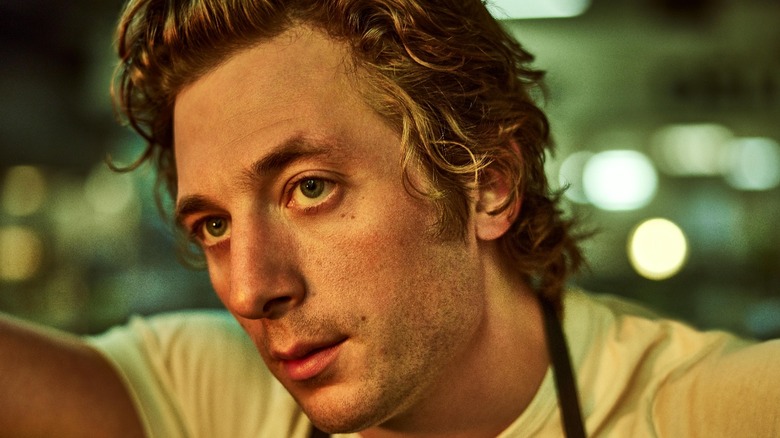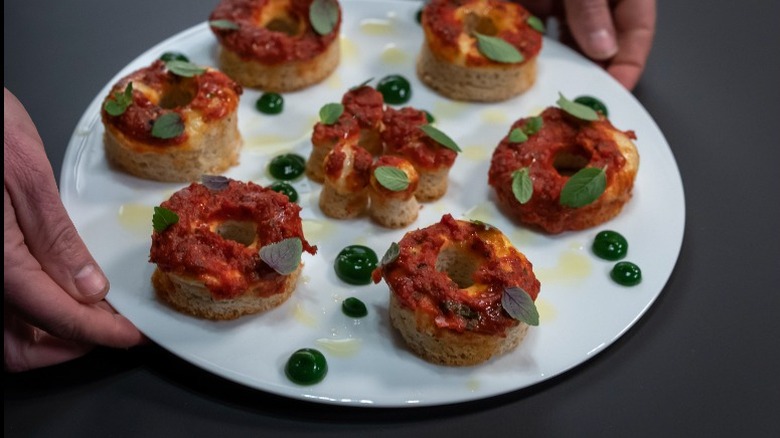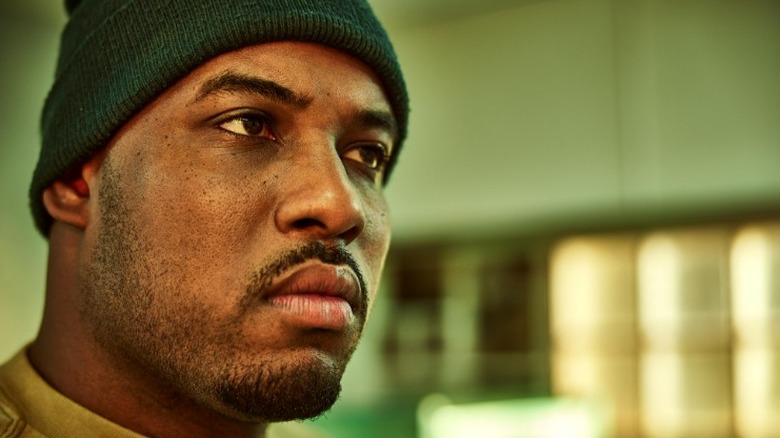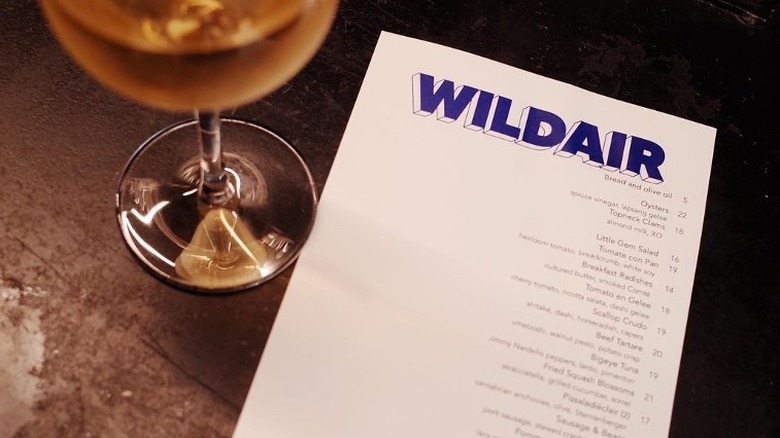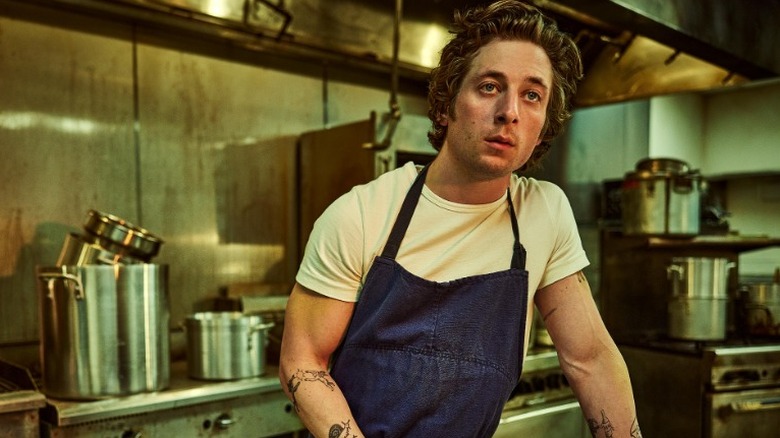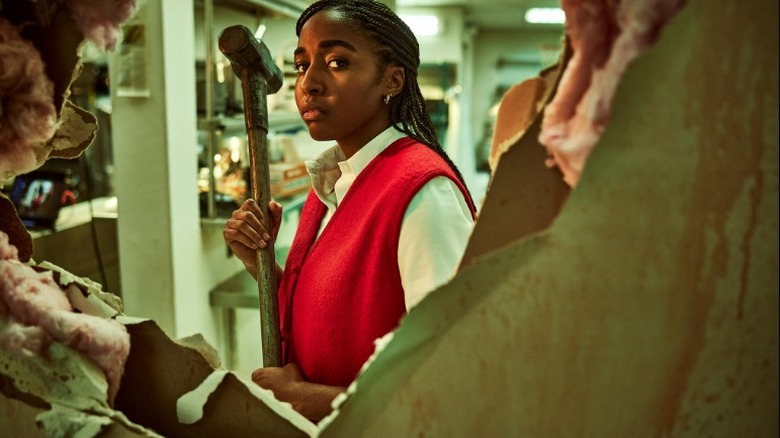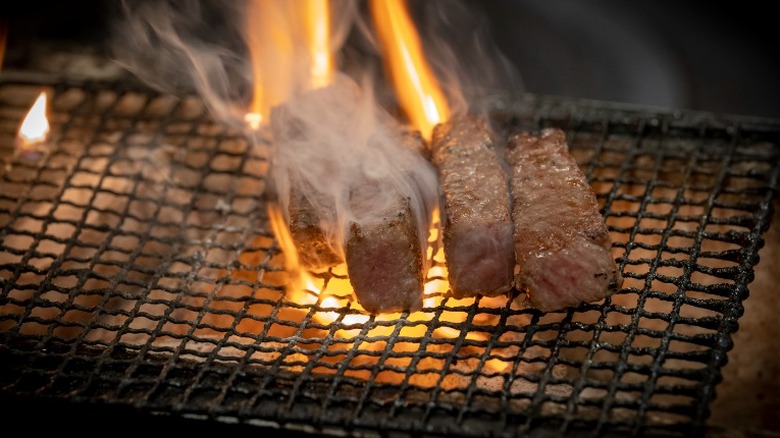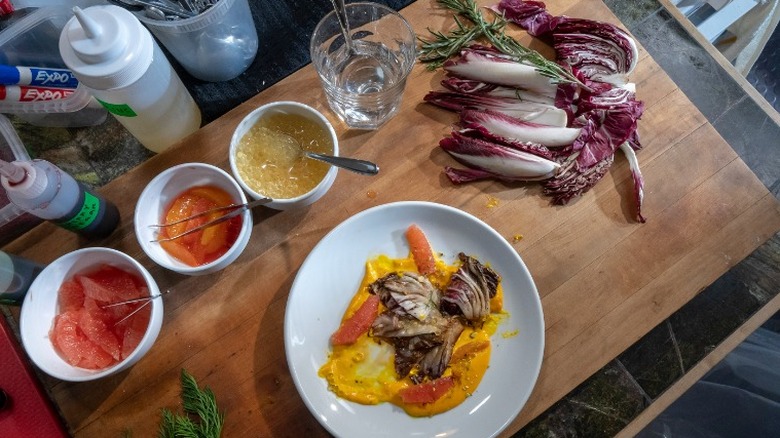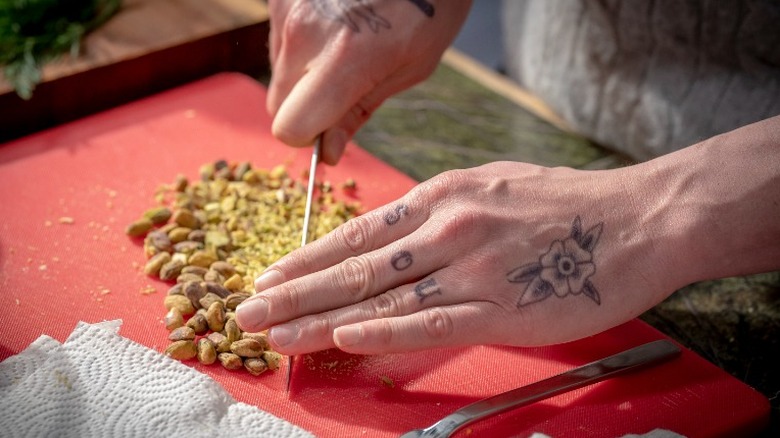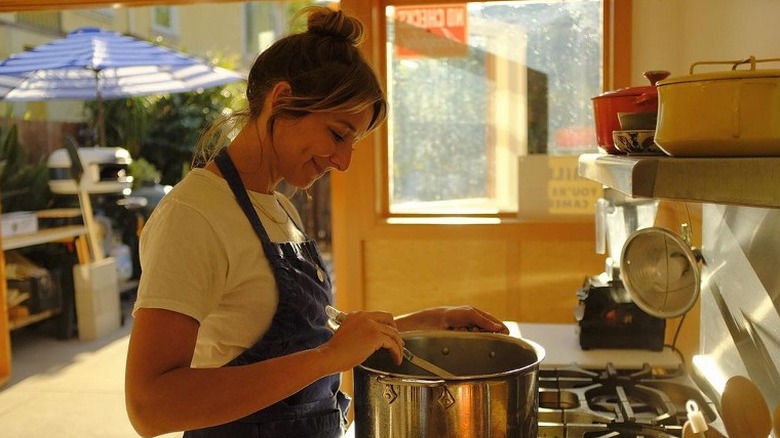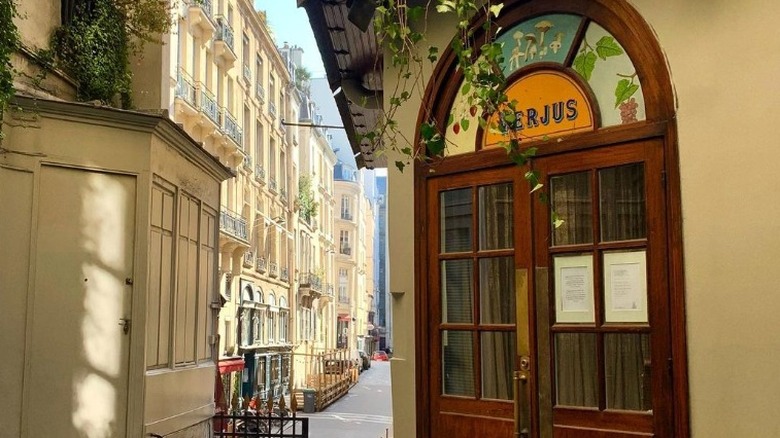What's On The Menu For The Bear Season 2, According To The Show's Culinary Producer - Exclusive
"The Bear" is back for a second course, and this season picks up roughly where viewers last saw the chefs and crew of the Original Beef of Chicagoland team. Only now, in possession of a financial windfall, the Beef owner and chef Carmen "Carmy" Berzatto (Jeremy Allen White) is set on reinventing the humble restaurant's digs with help from his sister Sugar (Abbey Elliot), chef de cuisine Sydney Adamu (Ayo Edebiri), and "cousin" Richie Jeremovich (Ebon Moss-Bachrach). Meanwhile, pastry chef Marcus (Lionel Boyce), handyman Neil Fak (Matty Matheson), and cooks Tina and Ebraheim (played by Liza Colón-Zayas and Edwin Lee Gibson, respectively) look to better their culinary futures.
In anticipation of a fresh serving of the Hulu/FX co-production, Tasting Table caught up with the show's culinary producer, Courtney Storer, to give us a taste of the savory, sweet, and sour notes to sink your teeth into this season. The veteran chef shared some of her inspiration for the show's culinary program and what went into bringing these dishes to the screen. In keeping with the realist nature of "The Bear," the conversation touched on how the show seeks to address some pressing questions about the restaurant industry, as well as personally impactful moments for Courtney and her brother, show creator Chris Storer.
This interview has been lightly edited for clarity. It contains minor spoilers for season 2 as well as sensitive discussions of personally traumatic events.
Just like the characters, the food is constantly evolving
"The Bear" was a hit out of the gate for a lot of reasons. For anyone who's spent time in a professional kitchen, the show's lucid portrayal of what it can be like to work in the service industry was a special sort of class representation. Then, of course, there's the food. From the first succulent shot of searing Italian beef to the final, luscious chocolate pouring over Marcus's cake, the show is as rich in visuals as it is in storytelling.
Fortunately, none of the culinary characteristics of the show's first season are going away. "So much about season one, with Italian beef, came from the heart," says Storer. "We grew up with the Zucchero family, who owns the Original Mr. Beef in Chicago, and so I knew that we didn't want to leave behind anything from season one."
With that in mind, season 2, will be moving some familiar dishes off-screen (goodbye chicken piccata and braised short rib), ending their run on the specials board. Instead, Storer tells us to expect a "finessed" version of the menu. "What you'll see is more of an elevated tasting menu that reflects Carmy and Sydneys' interest in not only Italian food but elevating really good produce, really good meat and fish, from whatever they're able to access in Chicago."
Key dishes offer insight into the mindset of the chef that prepared them
One of the most important things that cooking does for people (beyond keeping us nourished) is serving as a medium for integral moments in life. We all have meals we can remember — and maybe some we like to forget — as well as important moments that take place while cooking with others. According to Storer, the dishes that appear in season two of "The Bear" were carefully constructed. Her mission was to create dishes that worked like a vessel, helping viewers get a taste of how food memories affect their favorite characters. "You'll learn a little bit more about who's influenced these characters to cook the way that they cook," says Storer.
That sense of connection plays an even bigger role in the food that was conceptualized for the Beef's crew. "I wanted to make sure that each character was present in the dishes that were going to be created," Storer says. She notes that for Marcus, his creations will reveal a journey of passion and creativity. With Carmy, she aimed to develop foods that could help the character find new outlooks on dishes that were once painful to prepare.
"I think Sydney especially, this is someone who is trying so hard," Storer says. "I know how that feels. When you're trying to show your voice, trying to impress people, trying to prove your worth ... That real effort to be good. And how that feels when it's not noticed."
These real-life restaurants inspired the season 2 menu
When it came to creating the food and feeling of the semi-fictional Original Beef of Chicagoland restaurant, Courtney Storer had a lot to pull from. The real Mr. Beef has been going strong since the 1960s and was even a staple during Storer's early life. Dramatizing it for television wasn't a one-for-one take, but the inspiration for a classic, no-frills Chicago spot was literally in the walls.
This season sees the characters of "The Bear" move towards opening a renovated version of a neighborhood staple. For direction, Storer turned to some outside examples of what a reinvented classic could look and taste like. "I talked with Ayo a lot about this. She had gone to this restaurant in London called Jolene. And I remember she showed me pictures, and I said, 'I love it so much. I love the simplicity.'"
With the aesthetically austere design of Jolene in mind, Storer also looked closer to home for inspiration on the culinary style that a reconceived version of the Beef might have. She cites Fabián von Hauske Valtierra and Jeremiah Stone, creators of the dynamically paired concepts Wildair and Contra in New York City as helping to inspire the show's evolution. Inspiration also came on the West Coast, courtesy of Bell's in Los Alamos, California. According to Storer, the Michelin-starred tasting menu restaurant resonated with her thanks to its "elevating cuisine, perfect execution, but [with] almost a casual approach to it."
Family played an important role in how this season developed
Throughout its first season, "The Bear" remained a show about two primary concepts: the importance of food as a connecting force and the multitude of ways that family trauma shows up in life. For Courtney Storer and her brother Chris, neither theme was imagined.
According to Courtney, the Storer's shared family history made creating the menu more intuitive in a technical sense. "We've got a very similar understanding of food in the way we were brought up," she says. "We have a very similar palette, and I'm able to speak to Chris very easily and naturally. He knows my cooking career and my knowledge of Italian food."
Courtney explains that certain culinary experiences — like the smell of prosciutto, capicola, or red sauce — are enough to trigger childhood memories of grandmothers, uncles, and family functions. "My early food memories came from my family and are a huge defining characteristic of who I am as a chef," she says.
However, those recollections were not always easy to work with. "There's a lot of trauma that Chris and I passed in our childhood," Storer reveals. "And while that's heartbreaking, I think it's also a beautiful thing because cooking was the way that I found helped me cope." She adds that these past trials also helped the siblings develop the menu later on in the season.
The show highlights the financial struggles of running an independent restaurant
Starting any sort of new, independent business isn't cheap. The cost of opening a restaurant, however, can be one of the harder numbers to get a handle on. Market surveys put the average cost of opening around $375,000. Other estimates place the high-end cost near $700,000. And staying afloat isn't promised for those who have the money (or are already established). Food costs continue to rise, and as CNN reported at the beginning of 2023, the U.S. has 72,000 fewer restaurants than in 2019.
While the first season of "The Bear" concluded with an unexpected cash infusion that gave the financially-strapped crew some reprieve, higher hopes, and fresher digs, Storer reminded us that challenges still apply, even in this fictitious restaurant world. "It's super expensive to open any business, let alone a restaurant, in an area where prices could be increasing daily," she says. "So much of the excitement dies out when you see how much it actually costs to make these dreams become a reality."
For Storer, building a restaurant is a passion project that comes as a gamble in today's market, and this season of "The Bear" explores that risk and reward. "They learn quickly going into season two how hard it is and how expensive it is," she says. "We're scraping the surface of looking into that ... You'll see [this question] as the season unfolds, 'Was it worth it? To bet at all?'"
There's simmering conflict around what sort of restaurant (and chef) to be
Anyone who is professionally interested in food as an art form or food as a culture-bearing essential can attest to the creative challenges of the career. In an industry where celebrity is possible to achieve, Courtney Storer says that there is always a push and pull between how best to share oneself through this thing that people love and need. "You get to a place where you're climbing up to the top, you become a chef de cuisine or an executive chef, and 'What's next?' is always that question," she says. "Do we reach for the stars? Or do we just make a really good restaurant?"
In a gentrifying city like Chicago, the decision to change an established restaurant from its mom-and-pop character into one capable of chasing Michelin stars can be a domino that affects an entire neighborhood. Similarly, the choice to have a balanced life or burn out in pursuit of a goal is a fierce personal consideration for many chefs. According to Storer, the ultimate question for Carmy is: "Does being happy in your personal life produce better results in your professional life?"
The cast provided input for the food served on the show
When it came to conceptualizing the season 2 menu, Storer took a cooperative approach. Rather than coming up with a screen plan based solely on her own culinary ideas and experience, Storer says she plumbed the cast for suggestions. "I said, 'Well, what do you want to make? What do you like to eat? Because if you tell me, I can wrap my brain around that, and we can create together.'"
As will happen when you follow such a good recipe, the "really, really cool" collaboration resulted in some delicious things. Many of them became featured dishes. For example, Storer details that cast suggestions inspired the idea for the Feast of the Seven Fishes holiday dinner. A certain magnificent T-bone steak — the one where you can almost taste the tangy giardiniera through the screen? That was also a crowd-sourced addition to the show menu.
Then there's Marcus's honey bun dessert, which Storer developed with Lionel Boice. "We wanted to reinvent a classic that was something Marcus shared with his mom as a child." Since so many of us survived middle school fueled almost exclusively by America's favorite dessert, we'll speak for all those who now feel super old after witnessing a childhood icon be thoughtfully recreated on television: The nostalgic shrapnel is stickier than the inside of the wrapper.
The improved culinary skills of the cast are evident this season
Storer offers an impressive kitchen resume, working in restaurants such as Los Angeles hot spot Jon & Vinny's. Cookbook author, restaurateur, and chef Matty Matheson is a cast regular and producer, and series creator Chris Storer previously worked on documentaries for Thomas Keller and the restaurant Locol. However, only one of these culinary-minded creatives actually appears on screen. For the rest of the cast, simply "acting" their way through the restaurant routine wouldn't cut it.
Prior to the show's inception, series mains Jeremy Allen White and Ayo Edebiri took crash courses at Pasadena's Institute of Culinary Education. Lionel Boice staged at Copenhagen-based Hart Bageri. This time around, Storer aimed to create an even more authentic experience, increasing hands-on training with the cast. Per Storer, "Technique-wise, the stuff that they were doing was hard. This is a level-up for each character in their own way."
How exactly did the staff's culinary experience improve? Per Storer, it began with the tough love familiar to anyone who's worked in professional kitchens. "They know that I'm going to say, 'Hey, if we're breaking down that fish, I'm not doing it, you're doing it; you're breaking that fish down on camera."
For Courtney Storer, The Bear is art therapy
One of the reasons why it's so hard to place "The Bear" into a certain genre (is it a comedy? A drama?) is because the show is written and produced in a way that captures the true nuances of being human. In both life and this television show, laughter can come at the same moment as a dark memory.
Creating a program that encompasses these real-life struggles seemed daunting at first for someone who lives with family trauma, as Storer does. "There's a lot of things to shoot that were very painful. For me, I was very worried about how I would feel the day of," she reveals. But as production got underway, Storer found a restorative nature to exploring these difficult experiences. "With the show, it felt like art therapy, really."
Storer noted that the healing nature of the filming process was reinforced by a deep connection to the cast and crew, who helped support her and her brother Chris Storer during difficult scenes. "As siblings, there were a lot of moments to just grab [Chris] and give him a hug and just know that we were in it together," Storer says.
As can happen in art therapy, the trials developed into something creative. "It also informed the rest of the menu further on in the season," she adds. "Those big childhood experiences, and how to recreate them in your adult life and take ownership of them in a positive way."
Storer's experience at a famed Parisian restaurant inspired a fan-favorite menu item
In any television fandom, there are always favorites. It's regularly the hero, often the villain, and occasionally the side characters who gradually get more screen time and story focus as the season progresses. When your show is about cooking, the fan-favorite can also be a donut, and those perfect rings prepared by Marcus had viewers drooling. According to Storer, inspiration for Marcus's past and future pastry exploration was illuminated in the City of Light.
"My experience in fine dining at Verjus in Paris really came into play," Storer tells us. She reports being pushed to work on exciting, "out-of-the-box" dishes at Verjus, such as elevating Italian donuts with orange whipped cream. Using that background, she looked to bring more sweet treats to the screen through the Beef's pastry chef. "I tried to imagine what inspires him to elevate the things he loves, like donuts. That's how I landed on the orange zeppole and fermented cherry glaze." One can only hope that there's a recipe to follow.
